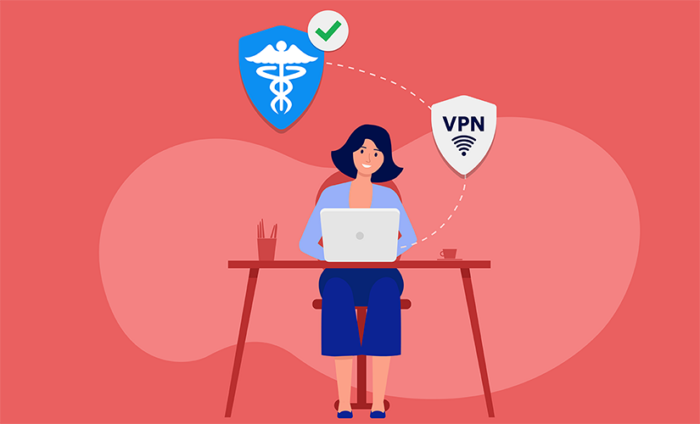In the past, only tech-savvy consumers used VPNs, or virtual private networks. Today, as online security threats increase and more employees work from home, major companies are starting to adopt VPNs. Why?
A VPN is a valuable tool for protecting sensitive data while you’re online. A VPN’s wide range of security features, like data encryption and access controls, makes it ideal for companies that are legally required to protect data.
Which businesses need to secure their data?
Healthcare organizations, for one.
Federal laws like HIPAA require that healthcare organizations keep their patients’ information safe. A VPN is a great way to protect that information. Let’s see how a VPN can help healthcare providers protect their patients’ data.
VPNs secure your company’s data while you’re online
It can be difficult for healthcare organizations to find a service that meets every legal requirement for data security, especially because healthcare companies don’t always have the largest IT security budgets.
According to a 2019 survey by Gartner, healthcare providers dedicated only about 5 percent of their overall IT budget to security. Clearly, this limited budget means that healthcare providers have to be careful when investing in security tools. Why is a VPN the right tool for healthcare organizations?
A VPN makes any network connection you use as secure as a private Wi-Fi network. It does this by masking your IP address, which makes it difficult for hackers to trace you online.
This means that you can safely connect to any network from any location. For instance, remote workers can connect to their work network from home, allowing them to access needed drives and information securely. Creating a secure connection is the basis for protecting your data, but a VPN does more than secure your connections.
VPNs can help control who has access to your data. A VPN service with a centralized cloud management platform allows you to customize each user’s access to data and can limit access to certain employees. Restricting access to patient data is another way a VPN improves your HIPAA compliance.
As we’ve seen, VPNs keep your data safe while it’s in your company’s servers. But what about when you send information elsewhere?
Thankfully, VPNs keep your data safe even when you send it outside your firewall. A VPN will automatically encrypt any data that you and your team transmit through emails or messages. So anytime you need to send patient information to medical providers or patients, you can be sure that the information is safe.
The right VPN helps healthcare organizations maintain their HIPAA compliance by preventing unauthorized access to PHI. But with so many options out there, you need to choose carefully to ensure you’re getting the best VPN for your business.
How to find the right VPN for your needs
Each VPN has specific features and limitations, which means you need to carefully scrutinize your options before you decide on one. Here are some basic steps to help you choose the right VPN:
- Conduct a risk assessment to determine what you need. A risk assessment will reveal the gaps in your company’s online security so you can choose a VPN that addresses those problems. These gaps could include remote workers having an unsafe internet connection and unauthorized employees accessing data.
- Look for a VPN provider that will sign a business associate agreement (BAA) with you. A signed BAA is a HIPAA requirement for any business you share patient data with. Having a BAA in place protects your business by stating exactly what a VPN provider is allowed to do with your patient data. This helps prevent data misuse on the VPN provider’s part.
- Prioritize the most important VPN features. There may not be a perfect fit for your business’s needs, so focus on the vital security features first. For instance, if you have a choice between a VPN that allows audits and a VPN that manages which sites your employees can access, the VPN that allows audits will address a more important need.
- Add extra security features to supplement your VPN. Depending on what your risk assessment finds, you’ll likely discover that you need more than a VPN can provide. Supplementing your VPN with other types of security, such as HIPAA-friendly online forms, can help cover all your bases.
Choosing the right VPN helps you protect the vulnerabilities in your business’s online security. By using a VPN, you’ll be able to prevent huge data breaches and the legal trouble that comes with them.
VPNs are an essential part of your security force
VPNs are no longer just for tech-savvy consumers. Now, even major businesses are using VPNs to help protect sensitive data from online security threats. By combining a VPN with your other security features, you’ll be able to keep your business HIPAA-friendly and secure.









































































































Send Comment: